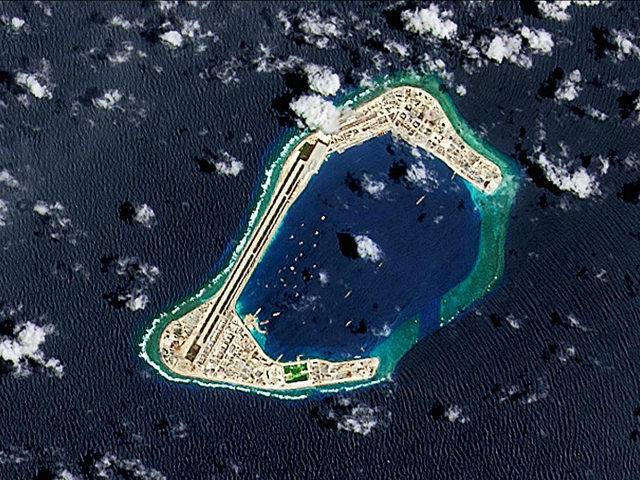On Thursday, Philippine Foreign Secretary Alan Peter Cayetano suggested the Association of Southeast Asian Nations (ASEAN) should reach a “gentlemen’s agreement” on South China Sea waterways because there is no legal authority to enforce a binding contract for navigation through the region.
“If it’s legally binding, which court can the parties go to? And the countries that do not comply, will they respect that court?” Cayetano said to reporters, as reported by Reuters. “Let’s start with it being binding, gentlemen’s agreement. We have a community of nations that signed it.”
He was referring to the draft framework for a South China Sea code of conduct between ASEAN and China on Thursday. Cayetano seemed to be throwing in the towel on getting China to sign a more stringent contract. As Reuters delicately puts it, there is “regional skepticism whether Beijing will commit to rules likely to restrain its maritime ambitions.”
Such a “gentleman’s agreement” would control shipping lanes that handle five trillion dollars per year in commerce. The proposal follows remarks by President Rodrigo Duterte that China was installing “some kind of armed garrison” on the disputed South China Sea islands it claims.
Reuters notes that some of ASEAN’s representatives believe China is playing along with the draft framework merely to “buy time for Beijing to wrap up construction activities,” at which point Chinese ownership of everything Beijing covets in the region would be a fait accompli, despite the Permanent Court of Arbitration in the Hague ruling against Chinese claims of sovereignty last year. China largely ignored the ruling, which explains Cayetano’s doubt that any controlling legal authority to enforce anything stricter than a gentleman’s agreement could be found.
Chinese officials spoke vaguely of encouraging progress made in the talks with ASEAN but would not establish a firm timeline for finalizing a Code of Conduct. For their part, the Association nations took a notably softer stance against Chinese development of disputed islands, abandoning complaints about “land reclamation and militarization” at their April 30 summit meeting that were part of the previous year’s declarations.
At the time, Philippine President Duterte bluntly stated that complaining about China’s maritime activities was pointless because no one could pressure China into halting them – a similar, if less tactful, sentiment to the one expressed by Duterte’s foreign secretary at Thursday’s meeting.
Deputy Foreign Minister Liu Zhenmin, head of the Chinese delegation, said the new draft framework “will be an internal document and nobody should publish it,” because keeping the details confidential was key to “future consultations” with the ASEAN nations.
Liu also expressed hope that “our consultations on the code are not subject to any outside interference,” in a rather obvious jab at the United States.
A report from the South China Morning Post said:
China and ASEAN committed to drafting the code 15 years ago, and while it should, in theory, tame how they behave in the South China Sea, it remains an open question whether Beijing will be willing to slow construction of artificial islands and pursuit of effective control over disputed territory. It’s another question whether Southeast Asian countries will have any leverage to ask Beijing to respect the rules.
The SCMP report states that China and the Philippines will continue bilateral talks aimed at “creating conditions for a final settlement over the two side’s claims in the South China Sea.”
Four ASEAN countries, including Brunei, Malaysia, Vietnam, and the Philippines, have territorial disputes with China in the South China Sea, along with Taiwan, which is not a member of ASEAN.

COMMENTS
Please let us know if you're having issues with commenting.